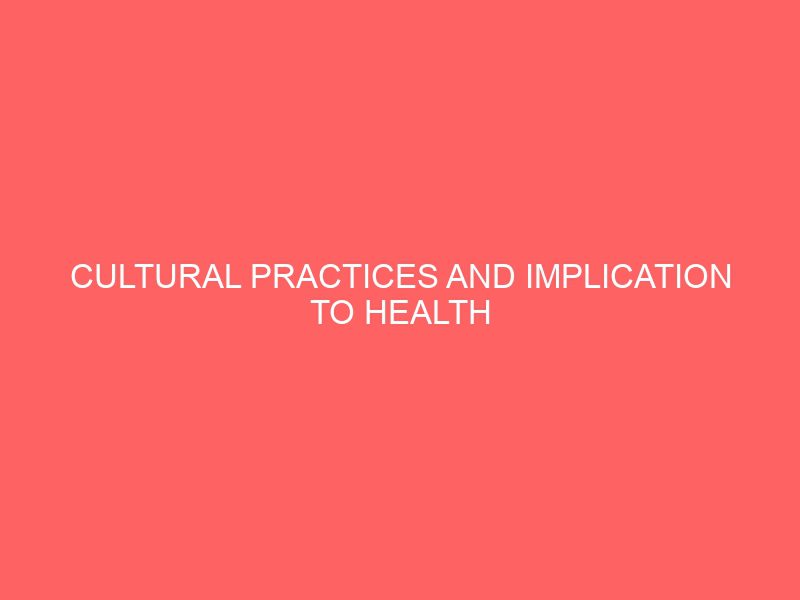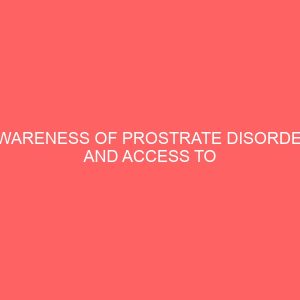Description
ABSTRACT
Harmful cultural practices have been identified as significant causes of disability and deaths particularly among women of reproductive age in developing countries. Hence, the researcher conducted this study to investigate cultural practices and implication to health promotion among Akoko Northeast local government area, Ondo state using community residents as target population. The sample consisted of two hundred and ten selected respondents using the simple random smapling size technique. The study employed multi-staged sampling technique. A questionnaire arranged in three sections was developed, validated and used for quantitative data collection in the study. Data collected were analyzed using percentages, frequency and mean. Among the major findings were that those harmful cultural practices such as early marriage, female genital mutilation, widowhood practices and nutritional taboos existed and were practiced in the community. It was recommended among other things that women should be educationally empowered. This would enable them to challenge those discriminatory attitudes and cultural practices which have held them captive, such as not participating in decision-making process in issues concerning their welfare which has hindered them from being integrated into the whole spectrum of community development programmes.
CHAPTER ONE
INTRODUCTION
1.1 Background to the study
Traditional cultural practices reflect values and belief systems that are upheld by members of a community or social group for time periods that most times span across generations. Saba (2009) posited that social groups worldwide have specific cultural practices and belief systems; some which are of benefit to every member while others which are harmful to a particular social group such as women, girls and children. Pertinent to note here is the observation that culture represents the development of a particular set of people in the society which is often associated with civilization. From the foregoing on culture, it is an obvious fact that culture has various definitions due to the presence of many writers on the concept. Hernlund (2010) asserts that culture is a totality of the way of life of a people developed over time in their bid to solve the challenges in their immediate environment. Consequently, culture embraces and includes problems to social, political, economic, aesthetic and religious norms, values and mode of organization, thus differentiating a set of people from their neighboring communities. Kisijia (2011) posited from a varying perspective, that culture can be seen as a complex and has a forcing nature which controls all parts of human life including food, religion, dressing and language, housing, marriage and family relations. In support of the view, Seralgaldin (2012) asserted that culture is a complex phenomenon with unique spiritual, material, intellectual and emotional characteristics that qualify a social group. Unfortunately, these old systems are still obtainable in some communities, subjugating women and rendering them vulnerable to obnoxious cultural practices which violate their fundamental human rights.
According to United Nations Organization (2009), health is a fundamental human right and not merely a social good which should be seen as an asset for individuals in the family, community and nation regardless of age, sex, origin or race. Sadly, women are the foremost victims of old and harmful traditional practices which mitigate their health and welfare (Berhane, 2009). Women are intentionally deprived of their freedom to express themselves and to also exercise their fundamental human rights. For instance, despite the high risk of maternal death, health and monetary impact of tradition or inadequate birth spacing; women mostly cannot exercise control over their own fertility and health decisions. This is why UNICEF (2009) concluded that women were mostly deprived of good health from birth such as in some traditional settings, pregnant and lactating mothers are forced to abstain from nutritious foods which are necessary for the child’s growth and development such as eggs, snail because these foods are regarded as taboo.
Apparently, the impact of resolutions at both global and nationwide conferences to eliminate all forms of harmful cultural practices have been unevenly felt in most developing nations, especially countries of Africa (Fredrick, 2016). In Nigeria, the National Population Council (2010) record indicated that female genital circumcision is high in Imo, Osun, Ondo, Delta and Cross River States. The practice of female genital mutilation (FGM) is less prevalent in the Northern part of the country with 77% in Kaduna. The National Base Line Survey (2014) showed that Ebonyi State ranked 76% score for female genital mutilation. The collective efforts made by different interest groups towards the elimination of all forms of harmful cultural practices which affect women’s health seem not to have made much impact. This may be attributed to the lack of vital information on the harmful cultural practices, hence, this study. Such a study will make information available on the nature and different parts of the subject matter. This will provide a guide towards developing a sustainable solution to the problem. In Nigeria, indigenous organizations have been working in different communities and locales creating awareness and educating women and individuals on the dangers of some traditional practices (Akpala, 2012). It is pertinent to note that nations like Ethiopia, Belgium, France, Sweden, United Kingdom and even Ghana have outlawed female circumcision and related practices (Akinola, 2011). This may be attributed to the fact that such practices have no relevance to national or individual development.
1.2 Statement of problem
Despite the National and International affirmations on enhancing the lot of women in the society, there still exist some harmful cultural practices, which are yet to be eliminated since they negatively affect the health of the women, children and individuals. As it is prevalent in most societies worldwide including Nigeria; women are usually subjugated to strictly household duties and nothing more regardless for their skills, social status or educational attainment. Information from World Fertility Survey (2009) showed that in nations like Nigeria, gender-based differences in healthcare received are largely attributed to the girl-child being undervalued by their families and society. Women’s risk to maltreatment in different forms is imbedded in the cultural and traditional practices and beliefs of their communities.
Unfortunately, many of these harmful cultural practices are still prevalent in some communities. For instance, harmful cultural practices like widowhood rites are highly occurring in the six geopolitical zones in Nigeria (Akumadu, 2010). Hence, the interest in establishing whether harmful cultural practices exist in the community under study; their impact on health of the individuals especially women, the reasons these harmful cultural practices resist change and control strategies needed to alleviate them.
1.3 Objectives of the study
The broad objective of this study is to investigate cultural practices and implication to health promotion among Akoko Northeast local government area, Ondo state. Specifically, this study seeks to;
- Determine the harmful cultural practices which are prevalent in the study area
- Ascertain the effects of these harmful cultural practices on individual and women’s health
- Determine control measures for eliminating the harmful cultural practices which affect the health of individuals and women in Akoko Northeast community, Ondo State.
1.4 Research questions
The following research questions were formulated to guide the study;
- What are the harmful cultural practices prevalent in Akoko Northeast community?
- What are the effects of these harmful cultural practices on individual and women’s health?
- What control measures could be employed to eliminate the harmful cultural practices which affect the health of individuals and women in Akoko Northeast community, Ondo State?
1.5 Significance of the study
The findings of this study will be of great importance and relevance to community leaders where the harmful practices prevail, as it will convince them of the need to improve traditional values and norms for individuals and especially women as well eliminate all harmful cultural practices that are detrimental to individuals’ health. Also, study will be relevant to non-governmental organizations which are interested in empowering women and individuals to address key issues of concern to fundamental rights and well being..
In furtherance, policy and law makers will find information on the situation of individuals and women, alongside the need to address the issues so that health status of individuals in the society will be given a prominence. The community will also benefit from the information tthat would be made available from the findings of the research, for collective action in the elimination iof harmful cultural practices. Therefore, the findings of this study will provide useful information the major stakeholders, the academia, health and policy recommenders as well as the society as a whole.
1.6 Scope of study
The study is limited to investigating the cultural practices and implication to health promotion in Akoko Northeast community, Ondo State. Furthermore, the study focuses on the women as key group that suffer from this cultural harmful practices in such communities. The variables include the harmful cultural practices prevalent in Akoko Northeast community, the effects of these harmful cultural practices on individual and women’s health and the control measures which could be employed to eliminate the harmful cultural practices. This study uses the Akoko Northeast community in Ondo State as the population for this study from which sample would be taken and analysis would be carried out.
1.7 Operational definition of terms
Harmful Cultural Practices are forms of violence which have been committed primarily against women and girls in certain communities and societies for so long that they are considered, or presented by perpetrators, as part of accepted cultural practice.
Health, as defined by the World Health Organization (WHO), is “a state of complete physical, mental and social well-being and not merely the absence of disease or infirmity.”








Reviews
There are no reviews yet.